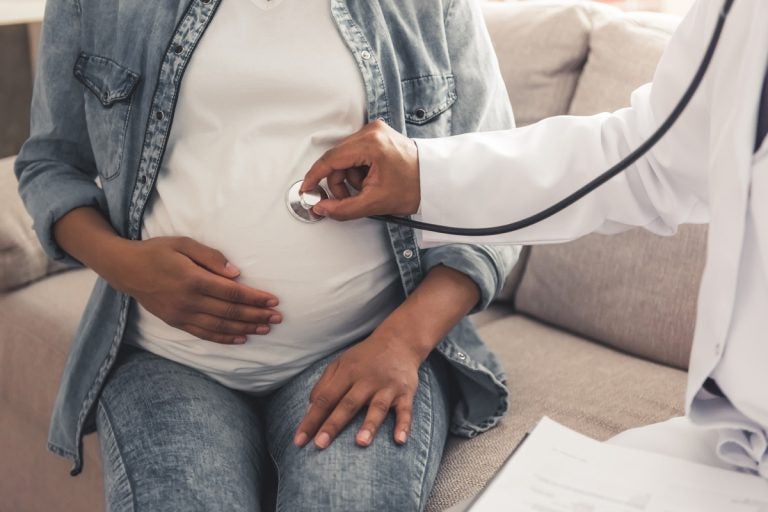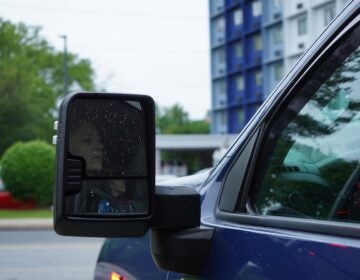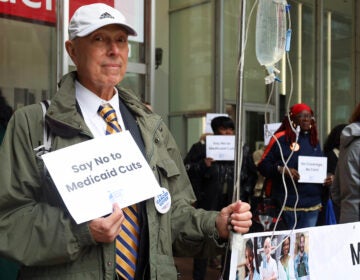Pennsylvania expands access to doula care by adding support professionals to its Medicaid program
As of Feb. 1, certified perinatal doulas in Pennsylvania can join the state’s Medicaid program as in-network providers in maternity care.

A medical professional holds a stethoscope on a pregnant person's belly. (VadimGuzhva/Bigstock)
From Philly and the Pa. suburbs to South Jersey and Delaware, what would you like WHYY News to cover? Let us know!
Ashlee Hedway has always been fascinated by the birthing process.
“Like since I was a kid,” she said. “My mom can tell you, she’d be like, ‘Why are you in here watching a baby story on TLC?’ Or something like that.”
Despite her interest, Hedway knew she didn’t want to become a nurse or a certified nurse midwife. It wasn’t until later when a friend became pregnant and hired a doula that she discovered a different career path.
“I had never even heard of it,” Hedway said. “Once she told me, I was like, ‘This is it. This is the thing.’”
Doulas are non-clinical professionals that provide emotional, physical and education support during and after pregnancy. Research shows that involving a doula can improve maternal and infant outcomes, especially during childbirth and in the postpartum period.
After going through education programs and getting trained, Hedway opened her own doula private practice in Lancaster during the COVID-19 pandemic with a focus of supporting Black and brown women and pregnant people.
Making the business side of her practice work has been a challenge, though, since most health insurance plans don’t cover doula services. Hedway said she’s had to be creative in billing as she tries to balance the financial means of her clients and her need to make an income from this career.
This balancing act may now become a little easier for providers like Hedway. Beginning Feb. 1, Pennsylvania’s Medicaid program, also known as the Medical Assistance Program, will allow certified perinatal doulas to offer their services as in-network maternity care providers.
Professionals and maternal health advocates hope this will expand access to doula services for people who may not otherwise be able to afford them out-of-pocket, and ultimately help close racial disparities in maternal and infant outcomes.
“People were already afraid, specifically Black birthing people, were afraid of giving birth,” said Gerria Coffee, president of the Pennsylvania Doula Commission. “Then the pandemic really expanded that fear and it really exposed gaps in access to support.”
Doulas who have or will get state certification in perinatal care can enroll in Medicaid to partner with managed care organizations that oversee and administer Medicaid health insurance in local communities.
The managed care organizations will pay doulas for in-network services that they provide as members of a maternity care team or service, according to a bulletin from the Pennsylvania Department of Human Services.
Coffee said the new partnership pathway is still in preliminary stages, so exact details on billing and payment structures will be explained in upcoming training sessions.
“This is completely new,” she said. “The majority of us have never done this before, and so we want to make sure that we have all the information available.”
Reimbursement is an important factor in the equation, Coffee said, because doulas need to know that their work is being valued for the time and expertise it takes to provide these services.
Hedway has been working full time as a doula and lactation consultant since last year. Making sure she’s able to meet demand in her community and make enough money has been difficult, she said.
“I quickly found out it is not the most sustainable thing, and it should be,” Hedway said.
Hedway said the new opportunity with the state’s Medicaid program could provide some financial stability or supplementation for doulas like herself.
While many remain optimistic about the new opportunity, Coffee said a lot of doulas still have some reservations about what the partnerships will entail and how receptive medical providers will be in working with doulas on these care teams.
It won’t be for everyone, Coffee said. For those who do participate, she hopes it leads to better support for both doulas and the communities they serve.

Get daily updates from WHYY News!
WHYY is your source for fact-based, in-depth journalism and information. As a nonprofit organization, we rely on financial support from readers like you. Please give today.





